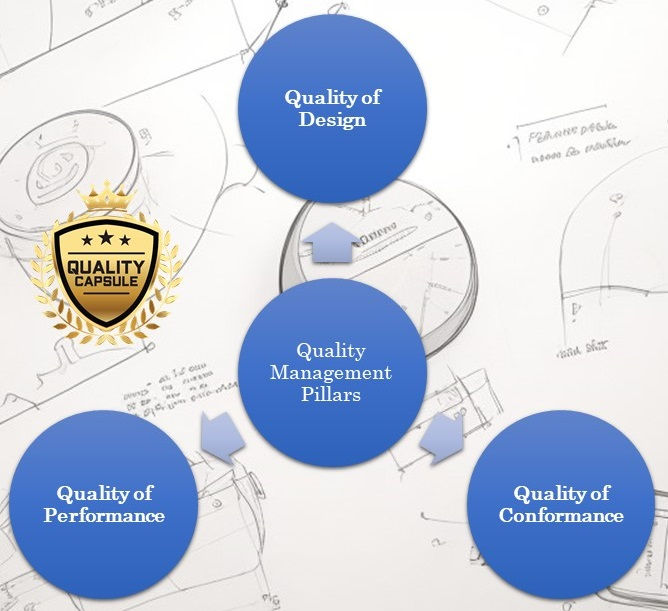Product Quality Dimensions
- islam Arid

- Oct 31, 2023
- 3 min read
Comprehensive Course on Enterprise Risk Management

Table of contents:
Our courses :
Introduction:
We all want top-notch products. Products that not only meet but exceed our expectations. But what makes a product truly high-quality or a total dud? Welcome to a journey through the quality dimensions, where we'll uncover the secrets to identifying top-quality products.
Quality dimensions are the various aspects or characteristics of a product or service that we use to assess its overall quality. These dimensions provide a holistic view of the product or service's performance and help us gauge its worth. Some of the key quality dimensions include performance, reliability, durability, serviceability, aesthetics, features, perceived quality, safety, and convenience. By considering these different dimensions of quality, we can gain a more comprehensive understanding of the overall quality of a product or service and identify areas where improvements can be made.
1. Performance:
Performance is about evaluating how well a product or service performs its intended function from the customer's perspective. Imagine a high-performance sports car. It accelerates quickly, handles corners smoothly, and provides an exhilarating driving experience, meeting and exceeding customer expectations.
2. Reliability:
Reliability measures the product's propensity to perform consistently over its useful design life. It's about the product's ability to deliver in a consistent and accurate manner over time. Think about a reliable smartphone that rarely crashes or freezes, consistently delivering a seamless user experience over the years.
3. Durability:
Durability focuses on how long a product can last. It's the effective life of the product before it's considered unfit for use, where repair is not possible. A durable product can withstand stress or trauma without failing. Imagine a rugged outdoor backpack that can withstand extreme weather conditions and heavy use, remaining intact for years.
4. Serviceability:
Serviceability assesses how easy it is to maintain or repair the product. It's crucial to ensure the product remains functional over time. For example, how long did it take to correct an error in your credit card statement by the bank? Also, consider home appliances, where easy-to-replace parts and accessible maintenance ensure a longer lifespan.
5. Aesthetics:
Aesthetics considers the visual appeal and design of the product. Aesthetically pleasing products often attract more customers. It encompasses style, color, shape, packaging, tactile characteristics, and other sensory features. Think of a beautifully designed luxury watch that not only tells time but also serves as an exquisite fashion statement.
6. Features:
Features refer to additional functionalities or capabilities the product offers aside from basic performance. More features can enhance the product's value and utility. Consider a high-end smartphone packed with advanced camera features, AI capabilities, and a multitude of apps, providing exceptional value to users.
7. Perceived Quality:
Perceived Quality is all about the impression a customer has after using a product or service. It's the aftertaste, the whole experience. How does the customer feel about the product after intended use? Perceived Quality can be influenced by highly visible product failures or how a customer is treated when facing a quality-related problem. For instance, imagine choosing an airline that consistently arrives late with luggage getting lost in transit. Your perceived quality of that airline would hit rock bottom.
8. Conformance to Standards:
Conformance to Standards is about whether a product matches the specific design criteria laid out for it. It's like a checklist for performance. Meeting these standards is crucial because it ensures that the product functions as intended, setting the foundation for trust between the customer and the brand.
conclusion
In conclusion, these dimensions of quality play a vital role in assessing a product's overall quality. Understanding and optimizing them can help businesses deliver products that not only meet but exceed customer expectations. Customers remember how they feel after using a product or service, and that feeling can determine their loyalty. So, businesses that make quality a priority will thrive. Whether you're a consumer seeking the best products or a business aiming to excel, these quality dimensions hold the key to success in the competitive world of products and services.
Our courses :
Hashtags:
#productquality #products #collection #premiumproducts #brandproducts #range #standarditems #worldclassdesign #bathcare #budgetproducts #servicewarranty #routinelife #tap #homedecor #kitchencollections #sanitaryware #introducing #like #prudencefaucets #share #worldclass #bathroomfittings #followforfollowback #vijaytraders #onlineshopping #fashion #quality #weddingseason #supremestandard #ainaabeautyraub






















Comments